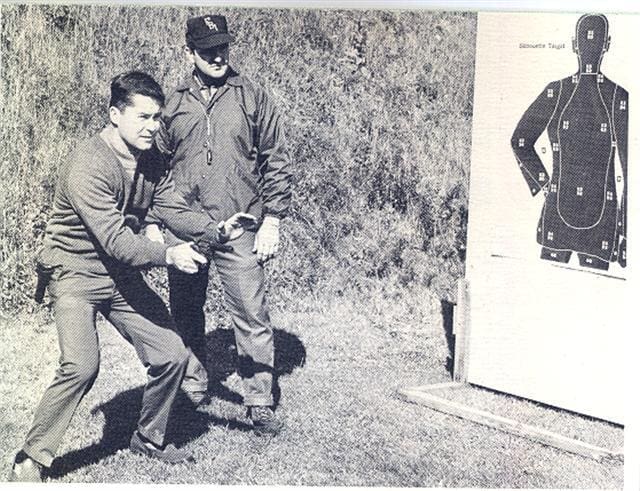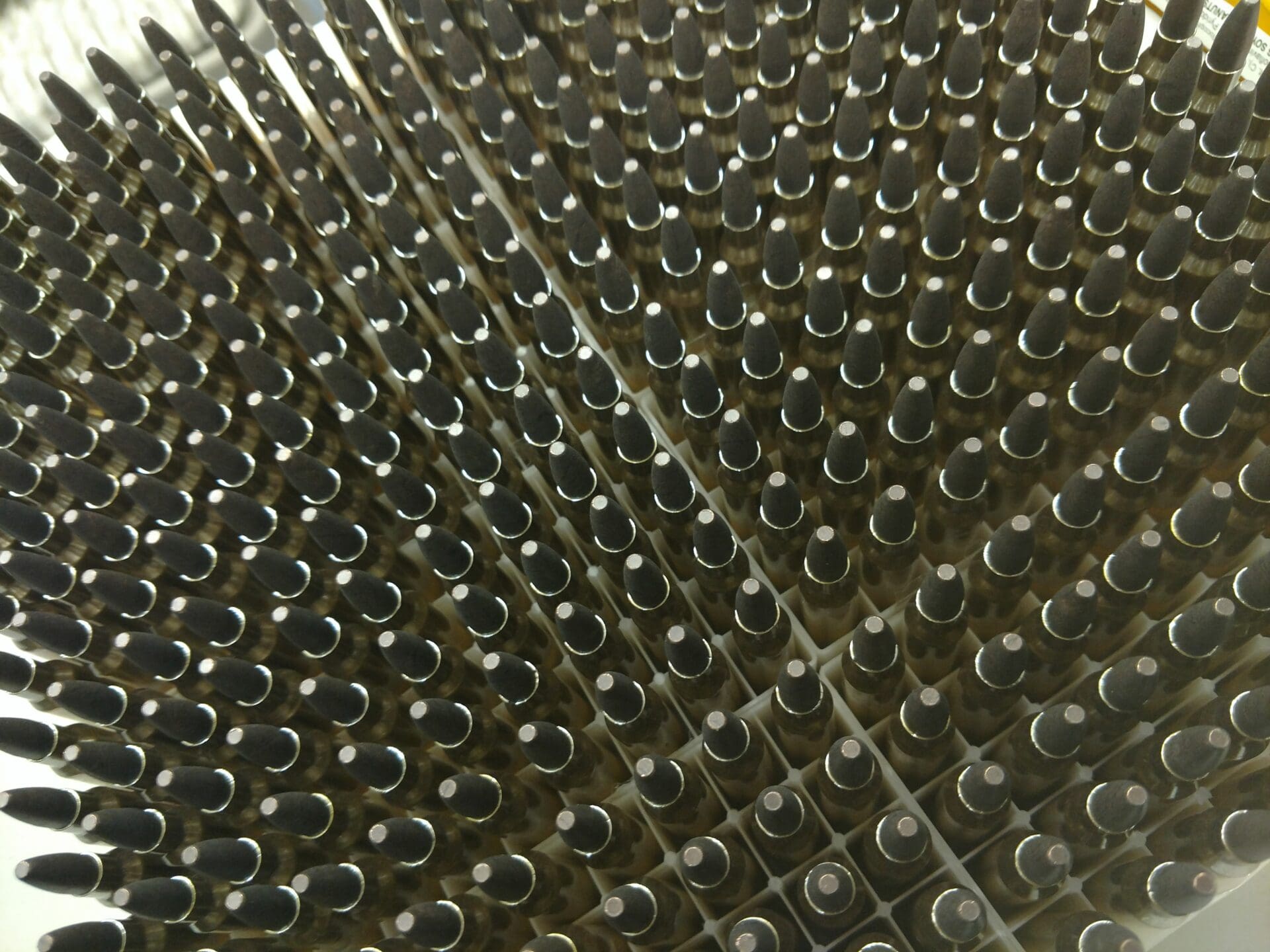Most police officers qualify with their service weapons and back-up guns every six months. And that’s it. Which is a holster full of not good. To protect themselves and the community in which they serve, officers need to become fully, instinctively proficient with their firearm. Shooting frequently increases accuracy and improves response time. The question is: how often should they practice? And what kind of practice? Those of us who train our brother officers have our opinion on the subject, often limited by time and budget. But what’s yours? In an ideal world, how would you like your police to practice with their guns?
[Christopher P. Fusaro’s a Road Patrol Supervisor and a police academy Adjunct Instructor. Click here to follow Chris’ wry Tweets.]





At least a mag weekly, refresher training monthly or once every 2 months.
Shooting a mag weekly only guarantees a larger department ammunition budget.
I’ve independently pursued courses that focus extensively on safe drawing technique, reloads, dealing with malfunctions, in addition to basic defensive marksmanship. These courses do wonders to improve your familiarity with your handgun. And they really help drive home that you don’t just stop shooting, unload and put down your gun when you have a malfunction the way a lot of target shooters do.
At a minimum, anyone who carries should try these courses. I’d hope officers get the opportunity to take these same types of course as well as as much force-on-force/shoot-no-shoot simulation training as they can lap up.
“Shooting a mag weekly only guarantees a larger department ammunition budget.”
Even in these trying economic times I think a cop can go into his own pocket for 60 rounds of ammo a month. I know a lot of people who spend a lot more of their own money than that on their jobs.
Well sure. I don’t care who pays for it. I’ve got no problem with PDs paying for it or the officers having to go out of pocket. But you can dump a mag down range a zillion times and still end up being a bad shot.
At least once a year using some sort of training/marking round in three or more well designed and well run force on force scenario, at least one of which can and should be resolved without deadly force and at least one that does require deadly force. Weapon used in FoF must mirror the officers primary weapon, or he can’t carry that weapon in the field. Scenarios should change frequently and involve single officers up to occasionally small groups of officers who on the same shift and same district and will often respond to a larger incident together.
Plus annual live shooting on square range and some that requires moving and shooting about 6 months after/before the FoF.
Daily. During every traffic stop.
Or does that only happen in Canton OH?
Good one!!! Police tactics…..first one to the Donuts.
For marksmanship I think cops should have to document that they’ve fired at least one magazine a week with 80% of the rounds hitting center mass at 21 feet. And twice a year have them prove it.
But I also think it should go beyond marksmanship. I think more cops need to be more familiar with their weapons, more religious about gun safety and more thoroughly drilled on shoot/no-shoot decision making.
And to be fair let me tell you straight up where my bias is. I grew up around cops, with 8 family members and who knows how many family friends on the NYPD. And most of those men should not have been trusted with guns. I’m willing to entertain the idea that my experience isn’t typical, but it’s hard to discount what one has seen close up like that.
Get Airsoft guns that are gas-operated and of the same model of the issued firearm. Do force-on-force with those once a month with “attackers” having various safe weapons (Nerf bats, rubber or shock knives, etc.). Firearm training is nice but standing on a firing line a going through a magazine slow-firing is not going to help the officers survive a surprise encounter.
I’d endorse that plan on the condition that all exercises are recorded and put on YouTube, because that would be awesome.
I’ve done this sort of thing with the shock-knives. It really shows you that if you’re in arms reach of someone with an edged weapon you’re going to get cut, it’s up to your defensive tactics to minimize the damage. It is funny when you get that shock-knife right under the armpit, guys really jump off their feet. I know I did!
Klingon Pain Sticks.
Mindset is the key. Military, police, or civilian with a ccw it is all the same. An individual has to want to be proficient. Some only want to do the bare minimum because they are really not into firearms. They do not take it serious enough. Some have limited budgets but do their best.
“Military, police, or civilian with a ccw it is all the same.”
I’m going to disagree with you a little on that. CCW holders should never be pulling their weapon unless they’re confronted with an immediate threat. Military personnel point their guns at perceived threats where there’s no presumption of innocence, you’re a threat until proven otherwise.
Cops, by the nature of their duties, have to point their guns at a lot of people who may very well not need to have guns pointed at them. Also they’re pointing a gun at you ideally it’s to defuse a situation, not necessarily to obliterate an enemy. So I think the mental discipline they need is going to be different and a lot more demanding than that of soldiers or armed civilians.
Agreed.
I think he was simply refering to the fact that one has to want to be good at something. That although some training might be better than other, a soldier or cop or armed citizen has to WANT to be proficient at what they do.
I don’t know where that idea comes from that cops “have to point their guns at a lot of people who may very well not need to have guns pointed at them.” Shouldn’t the cops operate on the same standard as CCW guys?
About the training, I say every work day, one hour. Some of that can be practicing techniques like someone said above and some of it can be actual shooting.
Just like anyone else who wants to carry a gun, they need to be practiced and qualified, even more so since, as cops, that’s their job.
No. Police have a duty to act. They go into violent or potentially situations that they know nothing about and figure out who did what as they go. CCW guys operates under different rules because society doesn’t charge them with acting to investigate crimes and find and arrest criminals.
Cops aim guns at people all the time because their job requires that they spend most of their time dealing with people who range from shady to evil, a fair number of whom make their living by using criminal violence and some of whom are perfectly willing to use violence against police if they think they can get away with it.
I’ve been in a building late at night and been confronted by a couple of officers with guns out searching the building after the alarm I didn’t know about went off. Have you ever needed to search a building for an intruder who could be totally authorized to be there (as I was) or could be a couple of armed felon on drugs? I didn’t have guns “aimed” at me, but they were in low ready.
When was the last time you as “CCW guy” needed to cuff, search and transport 4 people after a knifing or gunfight? I can assure you that if you are holding a firearm when the cops arrive at your shooting you will have guns aimed at you regardless of your moral standing.
Robbery, assault, or rape are not subtle crimes. A man sticks a knife to a woman’s throat, and says, “You’re coming with me,” her judgment that a crime is being committed is not likely to be in error. She is unlikely to shoot the wrong person.
A cop, on the other hand often encounters ambiguous situations. Who the good and bad actors are are not always readily apparent. The police have a duty, if not a legal obligation to act. You could getting knee-capped by the Red Brigades, the woman could step over your writhing body, and like a good New Yorker, use the cell phone she did not call 911 on, to take a picture of your corpse.
You are correct about the the different reponsibilities of military, police and ccw holders. All I am saying is individuals must have the mindset to go beyond the minimums to meet those responsibilities. We have to WANT to do the training to get anything out of it. Any course of fire is just ballistic masturbation unless we want to be there and are willing to learn.
I am not sure how to teach good judgement since most of mine has come from learning from my own mistakes. Some came from the mistakes of others. Senario based training will only go so far. The police have the hardest job. They have to make decisions with little to no information often in a very short period of time. They have to be courteous and polite even when a driver who just was pulled over is not. I am not sure that can be taught.
Training is the basis for performance but the correct mindset is fundamental.
“All I am saying is individuals must have the mindset to go beyond the minimums to meet those responsibilities”
On that point you couldn’t be more right. I’m genuinely baffled by anyone who picks up a weapon and wonders “what’s the least work I can get by on to handle this?”
I don’t have any advice for the local LEOs. As for ATF, I suggest they practice by shooting each other. Their skill at shooting children is already well-documented.
Comments are closed.